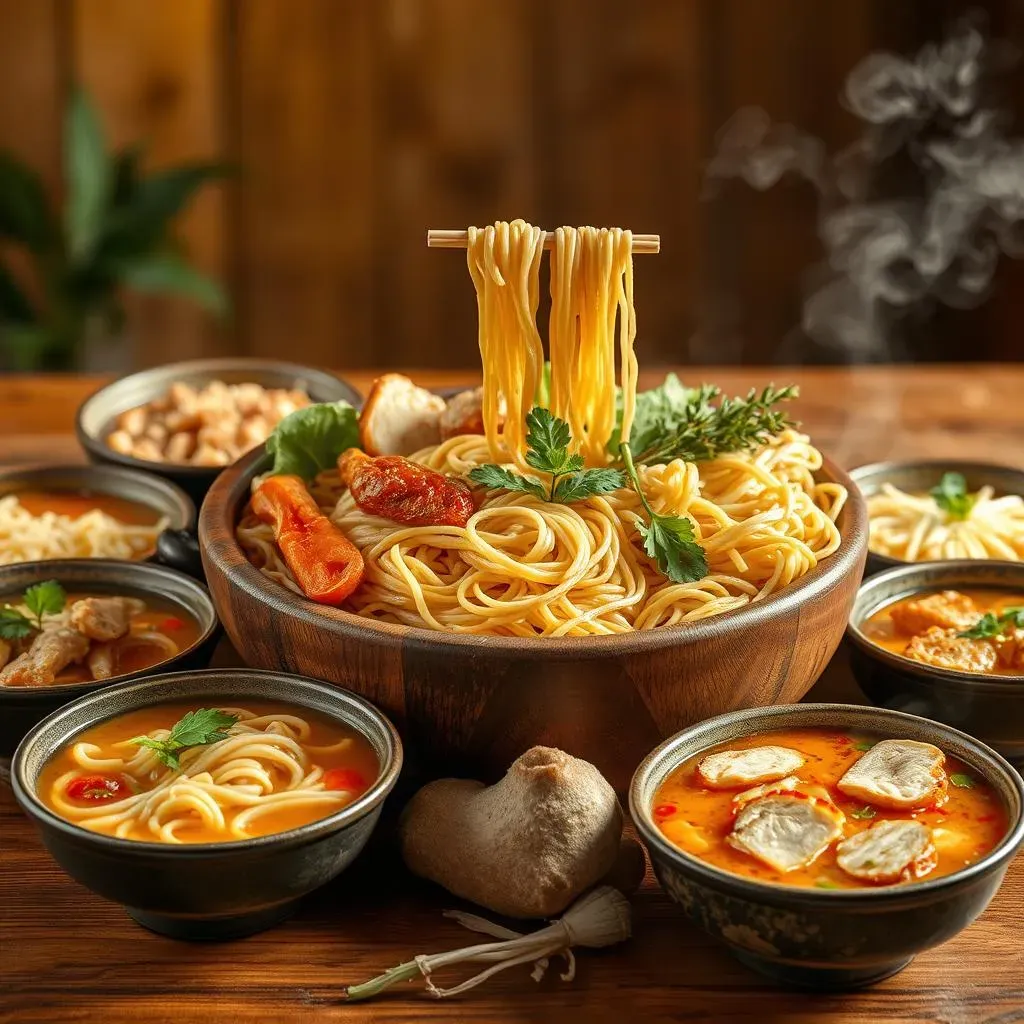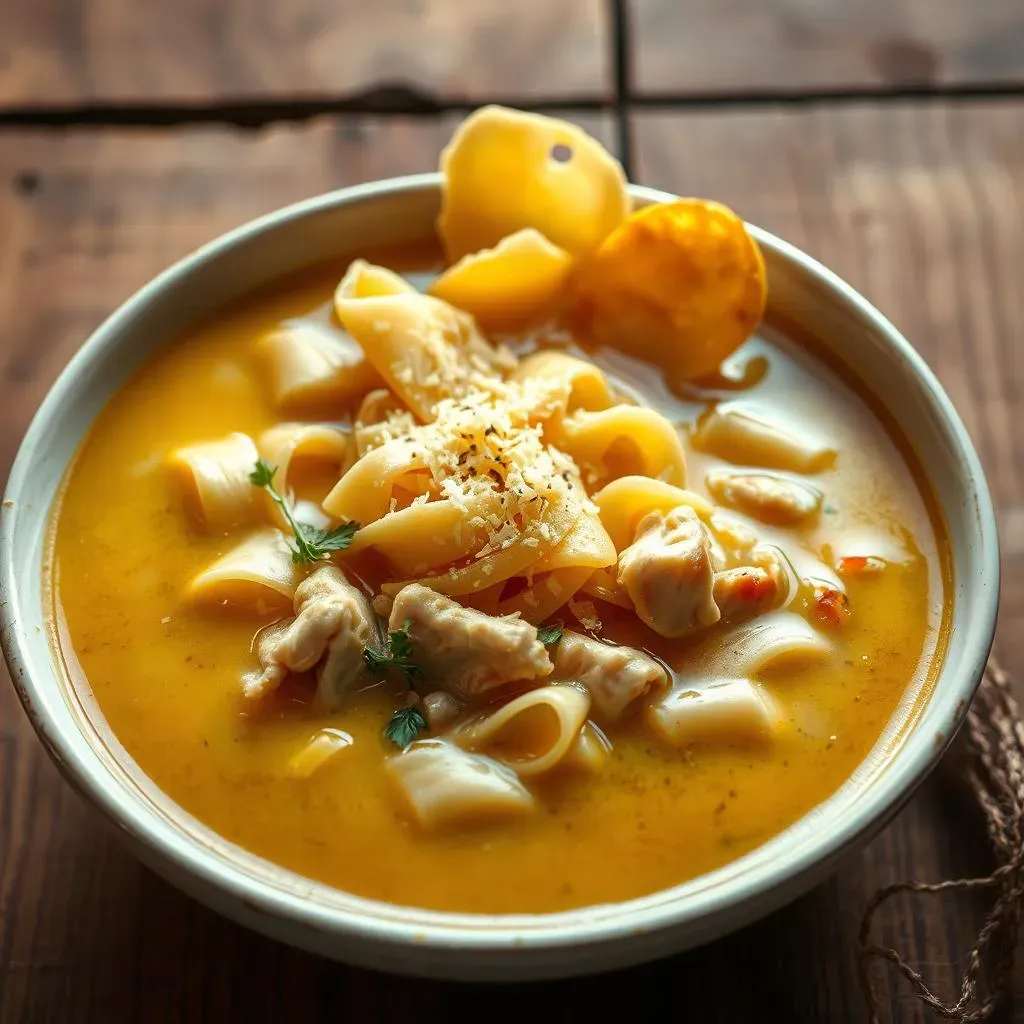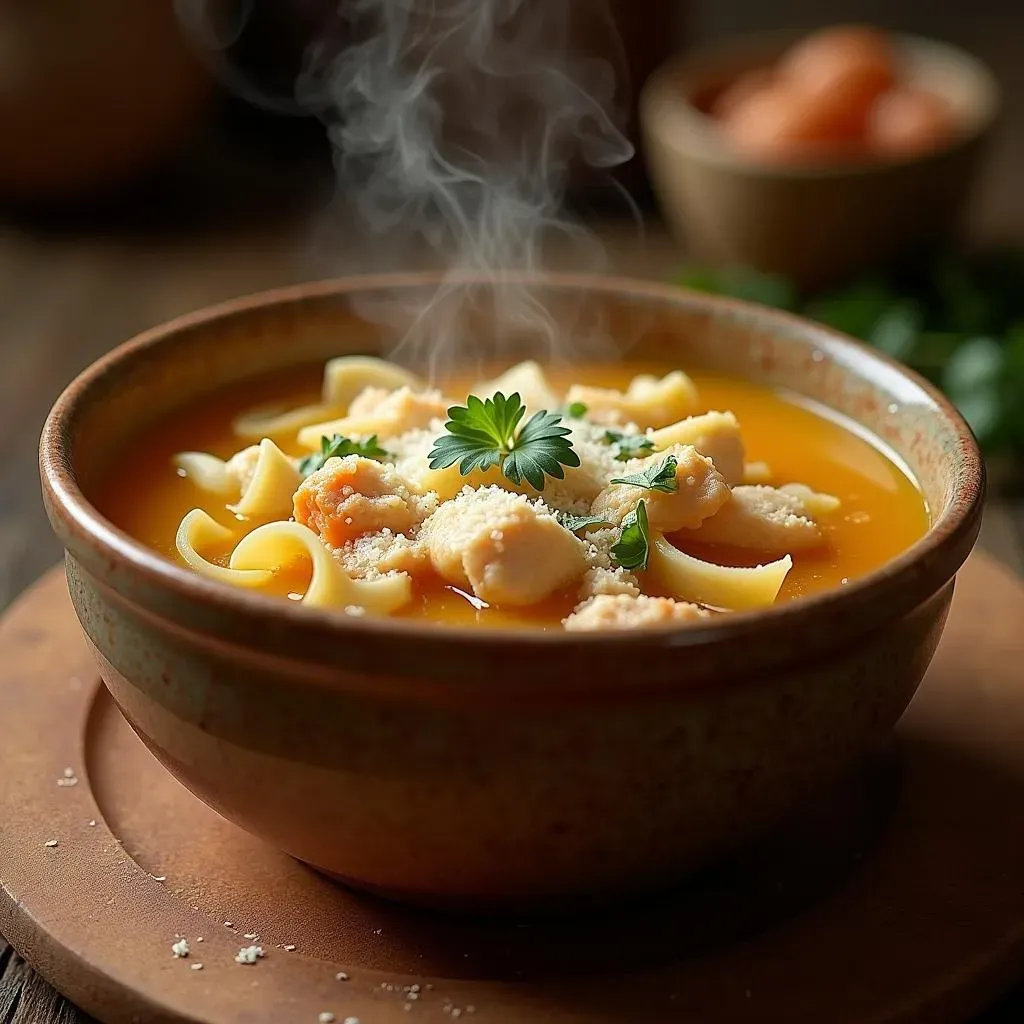Table of Contents
Are you ready for a culinary adventure that'll warm your soul and tantalize your taste buds? Then get ready to explore the delightful world of chicken noodle soup, elevated to new heights with the creamy, salty goodness of parmesan cheese! This isn't your grandma's chicken noodle soup (though we respect grandma's efforts). We're talking about a dish that's both comforting and sophisticated, a perfect blend of classic flavors with a gourmet twist. In this article, we'll embark on a journey into the heart of "chicken noodle soup with parmesan," exploring the secrets to crafting the perfect broth, selecting the ideal noodles, and, of course, mastering the art of incorporating parmesan for maximum cheesy deliciousness. We'll cover everything from building a rich and flavorful broth from scratch, to choosing the perfect pasta to complement your soup, and finally, to the art of adding parmesan cheese to achieve the ultimate cheesy perfection. Get ready to transform your simple chicken noodle soup into a culinary masterpiece! Prepare to be amazed by how a few simple additions can elevate this classic comfort food to a whole new level. Let's dive in!
The Perfect Broth: Building Flavor from Scratch

The Perfect Broth: Building Flavor from Scratch
Laying the Foundation: A Flavorful Start
The secret to incredible chicken noodle soup? It all begins with the broth! Forget those flimsy store-bought cartons; we're building a broth from scratch, bursting with flavor. Start with a good quality chicken – a whole roaster is ideal, but bone-in pieces work too. Toss those bones and some roughly chopped carrots, celery, and onion into a large pot. Cover with cold water, bring to a gentle simmer, then reduce heat and let it gently bubble away for at least an hour, or even longer for a deeper flavor. Skim off any foam that rises to the surface – it’s just impurities, nothing to worry about. Remember, patience is key here; the longer it simmers, the richer the flavor becomes.
Think of it like this: you wouldn't rush a fine wine, would you? The same principle applies to our broth. Adding a bay leaf, some peppercorns, and maybe a sprig of thyme or rosemary will add some lovely complexity. Once the chicken is cooked through, remove it from the pot and let it cool slightly before shredding the meat. Strain the broth through a fine-mesh sieve to remove the vegetables and any remaining bits of bone. Now you've got a base that's ready to be transformed into soup-tastic goodness. For a richer, more intense flavor, check out our creamy chicken noodle soup recipe – it’s a real flavor bomb!
Ingredient | Quantity | Notes |
|---|---|---|
Whole Chicken or Bone-in Pieces | 1 (about 3-4 lbs) | Organic is best! |
Carrots | 2 large, chopped | Adds sweetness |
Celery | 2 stalks, chopped | Adds savory notes |
Onion | 1 large, chopped | Adds depth |
Water | Enough to cover | Use filtered water for best results |
Adding Depth: Herbs, Spices, and More
Now that we have our basic broth, it's time to kick it up a notch. Remember those aromatics we tossed in earlier? They're doing their thing, but we can enhance the flavor even further. Consider adding a few extra ingredients to elevate your broth beyond the ordinary. A parmesan rind adds a surprising depth of savory flavor, while a splash of white wine or sherry adds a touch of elegance. Fresh herbs, like parsley or thyme, can also add a bright, herbaceous note. Don't be afraid to experiment! A little bit of ginger or garlic can add a wonderful warmth, or maybe a pinch of saffron for a luxurious touch. The possibilities are endless, and that's the beauty of making your broth from scratch. You're in control of the flavor profile.
Think about what kind of soup you want to create. Do you want a classic, comforting broth, or something with more of a kick? Experiment with different combinations of herbs and spices to find your perfect blend. For a spicier option, try our spicy chicken noodle soup recipe. It’s a real flavor explosion! And if you’re watching your sodium intake, be mindful of how much salt you add – you can always add more later, but you can't take it away. Taste as you go, and adjust seasonings accordingly. This is your chance to create a truly unique and delicious broth that will set your chicken noodle soup apart.
- Parmesan Rind (adds umami)
- White Wine or Sherry (adds complexity)
- Fresh Herbs (parsley, thyme, etc.)
- Ginger or Garlic (adds warmth)
- Saffron (adds luxury)
Noodle Nirvana: Choosing the Right Pasta for Your Soup

Noodle Nirvana: Choosing the Right Pasta for Your Soup
The Classic Choice: Egg Noodles
Let's talk noodles! For a truly classic chicken noodle soup, nothing beats good old-fashioned egg noodles. Their delicate texture and ability to absorb the flavorful broth make them a perfect match. Look for wide, flat egg noodles – they’re ideal for catching all that delicious broth and bits of chicken. Avoid overly thin noodles, which tend to become mushy in soup. The key is finding a balance between tenderness and a pleasant chewiness. Think of them as the comfy armchair of the noodle world – they're familiar, reliable, and always satisfying.
Don't underestimate the power of a good quality noodle. Using fresh egg noodles can significantly enhance the overall taste and texture of your soup. If you're feeling adventurous, consider experimenting with different shapes and sizes of egg noodles to see which best suits your taste. For a creamier version, you might enjoy our creamy chicken noodle soup recipe which uses a different type of noodle for a unique texture.
- Wide, flat egg noodles
- Fresh egg noodles (for superior taste and texture)
- Avoid overly thin noodles
Beyond the Basics: Exploring Other Pasta Options
While egg noodles reign supreme in the classic chicken noodle soup world, don’t be afraid to get creative! There’s a whole universe of pasta shapes and types waiting to be explored. Small, shaped pastas like ditalini or acini di pepe add a fun textural element, while orzo offers a slightly more substantial bite. Even thin spaghetti or angel hair pasta can work, creating a lighter, more delicate soup. The choice is yours! Just remember to cook your pasta al dente – you want it to hold its shape in the soup, not turn into mush.
Consider the overall flavor profile of your soup when choosing your pasta. For example, if you've added a lot of herbs and spices, a more delicate pasta might be a better choice so it doesn't overpower the other flavors. If you're looking for a heartier soup, a larger pasta shape might be more appropriate. And if you're a fan of Asian flavors, you might even consider using rice noodles for a completely different culinary experience. Try our Thai chicken noodle soup recipe for a delicious twist!
Pasta Type | Characteristics | Soup Style Match |
|---|---|---|
Egg Noodles | Classic, absorbs broth well | Traditional chicken noodle soup |
Ditalini/Acini di Pepe | Small, fun texture | Heartier, more rustic soups |
Orzo | Larger, more substantial bite | Soups with bolder flavors |
Spaghetti/Angel Hair | Delicate, light texture | Lighter, more refined soups |
Parmesan Perfection: Elevating Your Soup with Cheese

Parmesan Perfection: Elevating Your Soup with Cheese
The Finishing Touch: Parmesan's Magic
Okay, so we've got our amazing broth and perfectly cooked noodles. But what truly transforms this humble soup into something extraordinary? Parmesan cheese, my friend, parmesan cheese! It's not just about adding a salty, cheesy kick; it's about creating a symphony of flavors that dance on the palate. The richness of the parmesan complements the savory broth, the subtle tang cuts through the richness, and the nutty notes add a surprising depth of complexity. Think of it as the secret weapon in your soup arsenal.
Don't just sprinkle it on at the end, either. For a truly exceptional experience, consider adding a parmesan rind to the broth while it simmers. This adds an incredible depth of umami flavor that you won't find anywhere else. It’s like adding a secret ingredient that elevates the entire dish. For a different kind of cheesy goodness, check out our creamy chicken noodle soup recipe — it's a whole different level of cheesy deliciousness!
- Use freshly grated parmesan for the best flavor.
- Add a parmesan rind to the broth while simmering for extra umami.
- Experiment with different types of parmesan for varying flavor profiles.
Beyond the Grated: Parmesan Variations
Now, let’s talk about ways to use parmesan beyond simply grating it on top. You can stir in some finely grated parmesan into the soup at the very end for a creamy, luxurious texture. Imagine the silky smooth mouthfeel as you slurp up your soup. This method adds a subtle creaminess without making the soup too heavy. Alternatively, you can make a parmesan cream sauce to dollop on top of each bowl. This adds an extra layer of richness and sophistication. Or, for a truly decadent experience, try making crispy parmesan crisps to garnish your soup – a delightful textural contrast.
Think outside the box! Experiment with different types of parmesan. Aged parmesan will have a sharper, more intense flavor, while younger parmesan will be milder and sweeter. You can even try mixing different types to create your own unique blend. And don't forget about other hard cheeses. Pecorino Romano, for example, adds a salty, sheep's milk tang that can be a delightful complement to the chicken and noodles. For a unique twist, try our Mexican chicken noodle soup recipe, which uses a different type of cheese for a spicy kick.
Parmesan Technique | Description | Flavor Profile |
|---|---|---|
Grated on top | Classic, simple method | Salty, cheesy |
Stirred in | Creates creamy texture | Smooth, luxurious |
Parmesan cream sauce | Adds richness and sophistication | Decadent, flavorful |
Crispy parmesan crisps | Adds textural contrast | Salty, crunchy |
